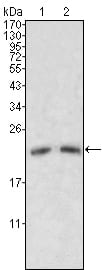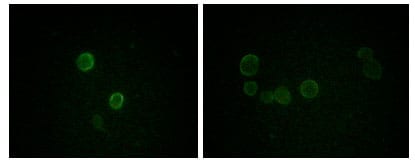

| WB | 1/500 - 1/2000 | Human,Mouse,Rat |
| IF | 咨询技术 | Human,Mouse,Rat |
| IHC | 咨询技术 | Human,Mouse,Rat |
| ICC | 1/200 - 1/1000 | Human,Mouse,Rat |
| FCM | 咨询技术 | Human,Mouse,Rat |
| Elisa | 1/10000 | Human,Mouse,Rat |
| Aliases | G3a; NG20; HSPC336; MGC22400 |
| Entrez GeneID | 55937 |
| clone | 8F12C6B8 |
| WB Predicted band size | 21kDa |
| Host/Isotype | Mouse IgG1 |
| Antibody Type | Primary antibody |
| Storage | Store at 4°C short term. Aliquot and store at -20°C long term. Avoid freeze/thaw cycles. |
| Species Reactivity | Human |
| Immunogen | Purified recombinant fragment of human ApoM expressed in E. Coli. |
| Formulation | Purified antibody in PBS with 0.05% sodium azide. |
+ +
以下是关于ApoM抗体的3篇代表性文献及其摘要内容:
---
1. **文献名称**: *Apolipoprotein M promotes cholesterol efflux from THP-1 macrophages by regulating the activation of ABCA1 and ABCG1*
**作者**: Christoffersen C, et al.
**摘要**: 该研究通过使用特异性ApoM抗体,证实ApoM通过激活ABCA1和ABCG1通路促进巨噬细胞胆固醇外流,提示其在动脉粥样硬化中的保护作用。
---
2. **文献名称**: *Apolipoprotein M binds to the chemokine CXCL16 and inhibits its function in vitro*
**作者**: Xu L, Dahlbäck B.
**摘要**: 研究利用ApoM多克隆抗体进行免疫共沉淀实验,发现ApoM可与CXCL16结合并抑制其趋化功能,揭示了ApoM在炎症调节中的新机制。
---
3. **文献名称**: *Development of a sensitive ELISA for quantification of human apolipoprotein M*
**作者**: Zhang XY, et al.
**摘要**: 本文报道了一种基于ApoM单克隆抗体的高灵敏度ELISA检测方法,成功应用于血浆样本中ApoM的定量分析,为临床研究提供了可靠工具。
---
4. **文献名称**: *Apolipoprotein M: structure, function, and potential therapeutic applications*
**作者**: Wolfrum C, et al.
**摘要**: 综述总结了ApoM的结构特征及其在脂代谢中的作用,重点讨论了针对ApoM抗体的开发进展及其在疾病诊断和治疗中的应用潜力。
---
以上文献涵盖ApoM抗体的功能研究、检测技术开发及临床意义,均为相关领域核心研究。如需具体期刊信息或出版年份,可进一步补充关键词检索。
Apolipoprotein M (ApoM) is a lipid-binding protein primarily associated with high-density lipoprotein (HDL) particles, playing a critical role in cholesterol metabolism and transport. It facilitates the formation of preβ-HDL, a key mediator in reverse cholesterol transport, and binds sphingosine-1-phosphate (S1P), a signaling lipid involved in endothelial protection and immune regulation. ApoM's functions have implicated it in cardiovascular diseases, diabetes, and inflammatory conditions, driving interest in developing ApoM-targeted research tools and therapies.
ApoM antibodies are immunological reagents designed to detect, quantify, or modulate ApoM in experimental and clinical settings. They enable studies on ApoM expression patterns, its interaction with HDL and S1P, and its regulatory mechanisms in disease models. Monoclonal and polyclonal ApoM antibodies are widely used in techniques like ELISA, Western blotting, and immunohistochemistry to explore ApoM's tissue distribution and pathophysiological roles.
Recent research highlights ApoM's therapeutic potential. Antibodies targeting ApoM or its pathways may modulate HDL functionality or S1P signaling, offering avenues for treating atherosclerosis or metabolic disorders. However, challenges remain in understanding ApoM's dual roles in lipid homeostasis and inflammation. Current studies focus on clarifying its molecular interactions and validating antibody-based tools for diagnostic or therapeutic applications, aiming to bridge gaps between basic research and clinical translation.
×